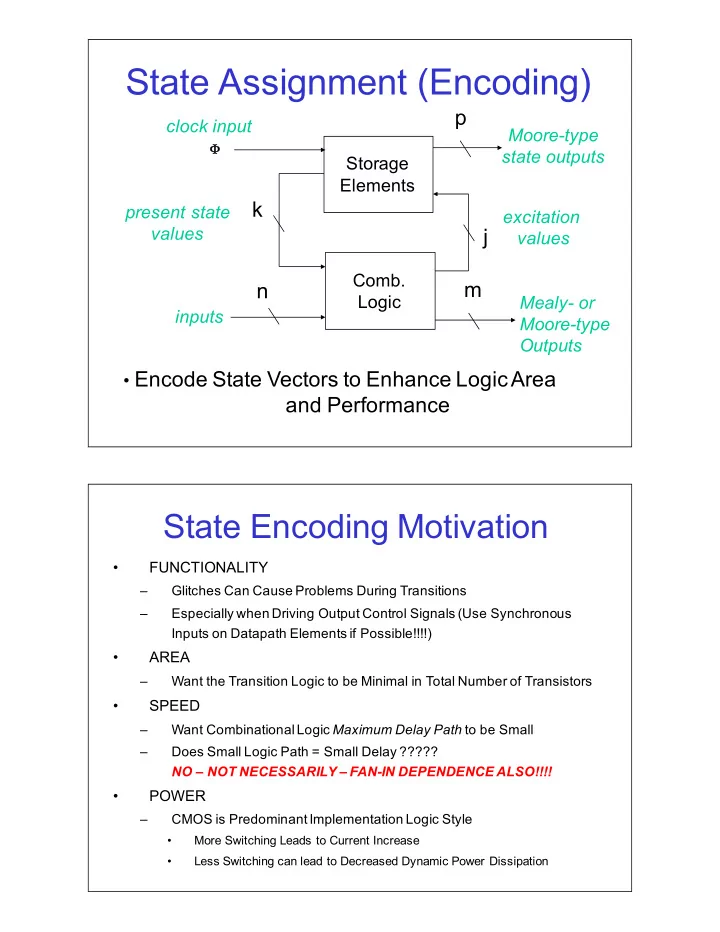

State%Assignment%(Encoding) p clock/input Moore,type Φ state/outputs Storage Elements k present/state excitation/ values j values Comb. m n Logic Mealy, or/ inputs Moore,type Outputs • Encode%State%Vectors%to%Enhance%Logic%Area% and%Performance State%Encoding%Motivation • FUNCTIONALITY – Glitches%Can%Cause%Problems%During%Transitions – Especially%when%Driving%Output%Control%Signals%(Use%Synchronous% Inputs%on%Datapath%Elements%if%Possible!!!!) • AREA – Want%the%Transition%Logic%to%be%Minimal%in%Total%Number%of%Transistors • SPEED – Want%Combinational%Logic% Maximum/Delay/Path to%be%Small – Does%Small%Logic%Path%=%Small%Delay%?????%%% NO#– NOT#NECESSARILY#– FAN/IN#DEPENDENCE#ALSO!!!! • POWER – CMOS%is%Predominant%Implementation%Logic%Style • More%Switching%Leads%to%Current%Increase • Less%Switching%can%lead%to%Decreased%Dynamic%Power%Dissipation
Example%Controller%(GLITCH) module contrlr1 (state, ld_xi, iterate, cnt_ld, cnt_en, busy,ld_b, done, clk, reset); input clk, reset, ld_b, done; output ld_xi, iterate, cnt_ld, cnt_en, busy; output [1:0] state; reg [1:0] state, pstate, nstate; reg ld_xi, iterate, cnt_ld, cnt_en, busy; // State encoding parameter S0=2’b00, S1=2’b01, S2=2’b10, S3=2’b11; // Register logic always @(posedge clk or posedge reset) begin if (rst == 1’b1) pstate <= S0; else pstate <= nstate; state <= pstate; end Example%Architecture%– GLITCH // Transition and output logic always @(pstate or ld_b or done) begin // Default assignments iterate = 1’b0; cnt_ld = 1’b0; busy = 1’b0; cnt_en = 1’b0; case (pstate) S0: if (ld_b==1’b1) nstate = S1; else nstate = S0; S1: begin iterate = 1’b1; ld_xi = 1’b1; cnt_ld = 1’b1; busy = 1’b1; nstate = S2; end
Example%Architecture%– GLITCH S2: begin cnt_en = 1’b1; iterate = 1’b1; busy = 1’b1 if (done==1’b1) nstate = S3; else nstate = S2; end S3: begin busy = 1’b1; nstate = S0; end default: nstate = S0; endcase end endmodule Simulation%Waveform%(GLITCH) ( timing/simulation/result )
Example%Controller%(NO%GLITCH) module contrlr1 (state, ld_xi, iterate, cnt_ld, cnt_en, busy,ld_b, done, clk, reset); input clk, reset, ld_b, done; output ld_xi, iterate, cnt_ld, cnt_en, busy; output [1:0] state; reg [1:0] state, pstate, nstate; reg ld_xi, iterate, cnt_ld, cnt_en, busy; // State encoding parameter S0=2’b00, S1=2’b01, S2=2’b11, S3=2’b10; // Register logic always @(posedge clk or posedge reset) begin if (rst == 1’b1) pstate <= S0; else pstate <= nstate; state <= pstate; end Simulation%Waveform%(NO%GLITCH) ( timing/simulation/result )
Technology%Mapping%(GLITCHES) Previous/Example/Mapped/to/Altera/EPM7XXX/Device Minimum%BitWChange%State%Assignment • Previous%Example%State%Diagram%Looked%Like: “Glitchy”%Encoding: s0 s1 s0=00,%s1=01,%s2=10,%s3=11 No%“Glitch”%Encoding: s0=00,%s1=01,%s2=11,%s3=10 s3 s2 Single/bit/Change/along/any/transition/ , Gray/Code/is/One/way/to/do/it
Gray%Code • Used%Along%Karnaugh%Map%Edges – To%Generate: REFLECTED/GRAY/CODE 00%01%11%10 – Reverse%Sequence: 00%01%11%10%10%11%01%00 – Add%Additional%0%to%First%and%1%to%Reversed%Sequences: 000%001%011%010%110%111%101%100 • What%About? MinimumWBit%Change%Code • Can%Assign%a%“Weight”%to%Each%Transition,%W i W i =%#%of%bit%Changes • Minimize%Sum%of%Weights • Gray%Code%Assumes%Equal%Weight%Transitions • Not%Always%Possible 1 2 00 01 10 10 1 2 1 1 1 2 01 11 00 11 1 2
Prioritized%Adjacency%Strategy • Assign%Adjacent%Encodings%(differ%by%1Wbit%Only)%to: 1. States%With%Common%Destination 2. States%With%Common%Source 3. States%With%Common%Output • Priority%is: 1. States%With%Same%Next%State%for%a%Given%Input%Value 2. Destination%(next)%States%With%Common% Source%(present)%State 3. States%With%Same%Output%Value%for%Same%Input%Values Prioritized%Adjacency%Strategy example 0/0 0/0 s0 s1 01 11 x/1 1/0 0/0 x/1 1/0 0/0 s3 s2 00 10 0/1 0/1 Priorities W Both%have%same%NS%(s3)%with%same%input%(0) 1. (s1,%s2) W Both%are%NS%from%Common%PS%(s0) 2. (s1,s2) 3. (s0,s1),%(s2,s3) W Both%have%Same%%Output%0(1)%for%Same%Input%0(0)
Minimum%Length%Codes • Smallest%Possible%Number%of%Bits%per%State%Vector% – to%represent% R states%the%length%must%be% k= " log 2 R # • Minimum%Length%Codes%Guarantee%Minimal% Number%of%Memory%Elements%are%Used • N is%Number%of%Possible%State%Assignments k 2 i R 1 R 1 − " # − − ( k ) ( k ) ( k ) N 2 i 2 ! 2 R ! ∏ ∏ = = − = − − $ % 1 & ' i 0 i 0 = = A A ! " # = $ % B A B ! ! B ( ) − & ' State%Transition%Diagram Not/Simplified! 01/00 reset 10/00 10/00 0¢ 5¢ 10¢ 01/10 00/00 00/00 00/00 01/11 xx/00 10/10 15¢ 20¢ xx/00 nd/dc%– nickel%or%dime/dispense%product%and/or%change% product%cost%is%15¢ *M. Clive, Bebop to Boolean Boogie
Minimum%Length%CodesWExample • Vending%Machine%Example:%%% R=5 – to%represent% R=5 states%the%length%must%be% k= " log 2 5 # =3 Minimum%Length%State%Assignment • Each%Possible%Assignment%can%Require%Different%Logic • Register/Memory%Element%Type%Also%Affects%the%Logic • Analyzing%all%6720%Assignments%for%Example%for%Minimized%SOP%2W Level%Logic%Yields%the%Following: TOTAL: 6720 *M. Clive, Bebop to Boolean Boogie
Minimum%Length%State%Assignment • Of%the%2.1%%that%Yield%7%Product%Terms% Look%at%Literal%Count TOTAL: 138 • Given%that%Minimum%Length%State%Assignment%is% Required • Chances%of%Optimal%Assignment%if%“Randomly”%Assign% State%Vectors%is%Less%Than%1%!!!! *M. Clive, Bebop to Boolean Boogie Optimum%State%Assignment%for%Example • One%of%the%66%Optimum%(in%terms%of%minimized%product%and%literal% count)%is: • Brute%Force%Approach%for%FPGA%Based%State% Assignment%Using%Minimum%Length%Vectors: 1) Choose%Device 2) Synthesize%For%all%Possible%Encodings 3) Use%Analysis%tools%(timing%and%area%reports) *M. Clive, Bebop to Boolean Boogie
State%Assignment%for%Delay%Minimization • Approaches%can%be%Based%on%Area,%Delay,%Power%Minimization • “OneWhot”%is%Usual%Approach%for%Speed – One%Bit%in%Vector%for%Each%State – Only%a%Single%Bit%is%Set,%All%Others%are%ZeroWvalued – Always%2Wbit%Adjacent%State%Change • Can%Result%in%Simple%and%Fast%Transition%Logic%Networks • Requires%Number%of%Storage%Elements%Equal%to%Number%of%States • Usually%Not%Helpful%for%Small%Number%of%States%in%Controller • Often%Used%for%FPGA%Designs%Since%Operating%Speed%is%Typically% Harder%Constraint Example/(from/Vending/Machine/Example/Earlier) There/are/Still/Multiple/Choices/for/a/One,hot/Encoding!! State%Assignment%(Encoding)%Summary • Encoding%of%FSM%states%is%an%implementation% decision • For% K states,%need%a%minimum%of% " log 2 (K) # DFFs • Minimal%encoding%examples%for%two%FF%Controller: – S0%=%00,%%S1%=%01,%%S2%=%10%%(BinaryWcounting%order) – S0%=%00,%%S1%=%01,%%S2%=%11,%(Gray%code%for%S0W>S1W>S2) Gray%code%usually%faster%less%logic%than%counting%order – Gray%Code%not%Always%Possible%W Try%to%Use%Minimal% Adjacent%BitWChange%Coding – Multiple%Minimal%BitWChange%Encodings%Possible – Can%Consider%Which%State%Transitions%Occur%Most% Frequently%for%Minimal%BitWchange%Encoding%Assignment
State%Assignment%(Encoding)%Summary • OneWhot%encoding,%one%FF%per%state – S0%=%001,%S1%=%010,%S2%=%100 – For%large%FSMs%(in%terms%of%states),%oneWhot%can%be%faster%than% minimal%adjacent%bitWchange%encoding – OneWhot%Still%has%Many%Different%State%Assignments • Optimal%Assignment%is%an%NPWhard%Problem – Good%heuristic%Methods%have%been%Developed – Public%Domain%Programs%KISS,%NOVA,%MUSTANG,%JEDI – Different%Methods%for%Different%Criteria:%Area,%Delay,%Power – Different%Methods%for%Different%Implementation%Technology:%PLDs,% FPGAs,%Custom • Symbolic%Encoding%Support – New%Generation%HDLs%Support%UserWdefined%Types%( #define )%Such%as% SystemVerilog%and%SystemC – Some%Synthesis%Tools%Incorporate%Automated%State%Assignment% (Quartus%does%not%have%this%Feature)
Recommend
More recommend